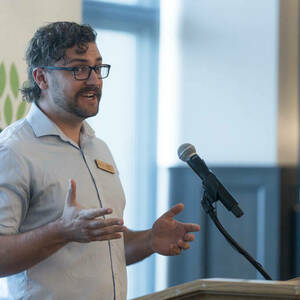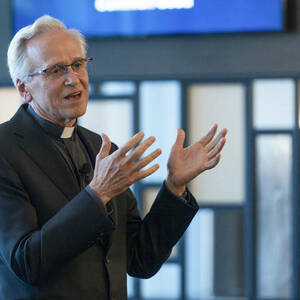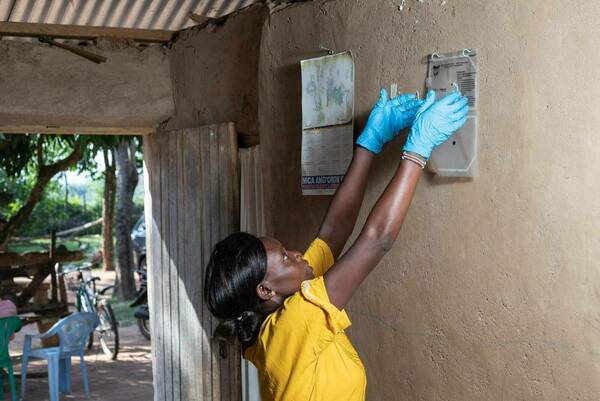Institute for Ethics and the Common Good Hosts Launch Event
The Institute for Ethics and the Common Good (ECG) held its official launch event on Monday, September 9, at Foley's in O'Neill Hall. The celebration provided an opportunity for ECG's University partners—faculty, staff, and students—to become better acquainted with the institute and its work. Formerly known as the Institute for Advanced Study, the transformed, expanded institute plays an essential role in advancing the University-wide Ethics Initiative emerging from Notre Dame 2033: A Strategic Framework.
Meghan Sullivan, Director of ECG and the Notre Dame Ethics Initiative, told attendees, "It is my greatest hope as director that the Institute for Ethics and the Common Good is going to be an engine for growing your dreams—a place where together we can build Notre Dame into the top destination for students and scholars and leaders who feel called to take on some of the most complex ethical issues of our time."
Sullivan outlined many of the ways in which ECG is investing in this effort: through grants and fellowships for scholars, both at Notre Dame and at universities around the world, who focus on ethical research and signature course development; support for Notre Dame doctoral students who study important ethical questions; and, working through the Ethics Initiative, support for University schools and departments in the process of hiring new faculty and launching new postdoc programs.
Leadership in ethics, Sullivan said, is deep in Notre Dame's DNA—and is desperately needed in a world confronting crisis after crisis.
"It's critical that the research that we do, the courses that we teach, and the programs that we build here at Notre Dame remind the world that there is a deep good out there that we can understand and we can help them to see."
University President Emeritus Rev. John I. Jenkins, C.S.C., was the event's guest speaker. The new Jenkins Center for Virtue Ethics, which honors his legacy, is a key component of ECG. The institute is also home to the Notre Dame—IBM Technology Ethics Lab.
"This effort will succeed if the people in this room put their arms around it in, in their own particular roles, with their own particular contributions, and move it forward," Fr. Jenkins said, underscoring Sullivan's comments about the collaborative and connective nature of the institute. "I believe this institute and the efforts of all of you will make this place a powerful center not only for the people here, but a distinctive voice—a powerful voice—in a world that really looks to us."
At the end of the evening, attendees received gifts of plants created by the Botany Shop, a locally owned business in South Bend's Near Northwest neighborhood. The blue planters brimming with pothos, philodendrons, and other hardy greens emphasized the metaphor of interconnected growth and flourishing.
---
The Institute for Ethics and the Common Good (ECG) facilitates interdisciplinary research in foundational and applied ethics, coordinates projects that cross departments and units, and supports ethics-related education and public engagement efforts. ECG is a signature element of the Ethics Initiative, one of several University-wide strategic efforts that draw on expertise from multiple colleges, schools, centers, and institutes in order to make the most meaningful contributions to questions of national and international concern.
Originally published by at ethics.nd.edu on September 10, 2024.
Latest Research
- NSF Cyber SMART’s fall meeting shapes fifth year of project, legacy and future plans, and adds new memberThe U.S. National Science Foundation (NSF) Cyber SMART center gathered for its fall meeting on the University of Notre Dame campus this September. The meeting served as a checkpoint with progress reports and new projects from research leads and students…
- Slavic and Eurasian studies professor wins Humboldt fellowship to research how Russia’s religious past shapes its presentWhen Russia invaded Ukraine on Feb. 24, 2022, Sean Griffin realized his second book needed a new title. Griffin, an associate professor in the University of Notre Dame’s Department of…
- Notre Dame’s R.I.S.E. AI Conference builds interdisciplinary collaboration to inform human-centered artificial intelligenceAs artificial intelligence (AI) transforms nearly every sector of society — from healthcare and education to governance and global development — a critical question emerges: How can we conscientiously design and deploy these powerful technologies to positively impact society? This…
- University of Notre Dame joins the Global Coalition of Ukrainian StudiesThe University of Notre Dame has joined the Global Coalition of Ukrainian Studies after signing a Memorandum of Cooperation (MOC), formalized on September 24, 2025, at the Ukrainian Institute of America in New York City. Notre Dame joined four other American…
- The University of Notre Dame’s Mendoza College of Business and Industry Labs team up to inspire national security manufacturing competitiveness in the regionThe South Bend - Elkhart Region is full of manufacturing companies that are poised to grow, and Executive Master of Business Administration (EMBA) and Master of Business Administration (MBA) students at the University of Notre Dame are finding innovative ways to contribute to that growth. Earlier…
- Notre Dame research informs WHO conditional recommendation for spatial repellents in malaria vector controlThe World Health Organization (WHO) recently announced a “conditional recommendation” for spatial emanators, also known as “spatial repellents,” in the fight against malaria. This key determination was informed by spatial repellent studies that included the Advancing Evidence for the Global Implementation of Spatial Repellents (AEGIS) Project in Kenya, led by the University of Notre Dame and funded by Unitaid. The findings from this particular study were recently published in The Lancet.
























